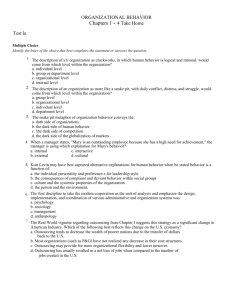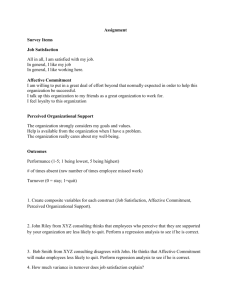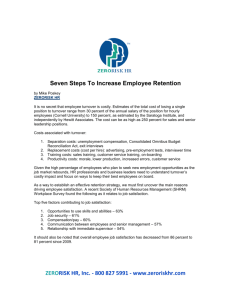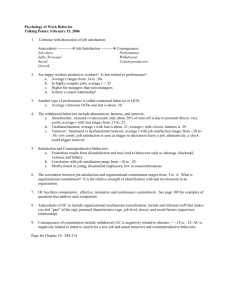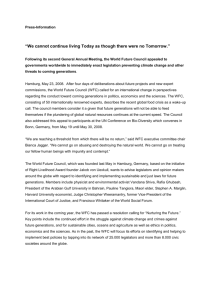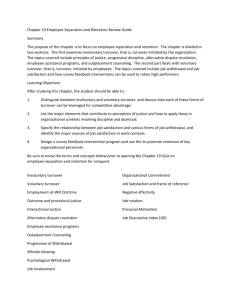Chapter 6
advertisement
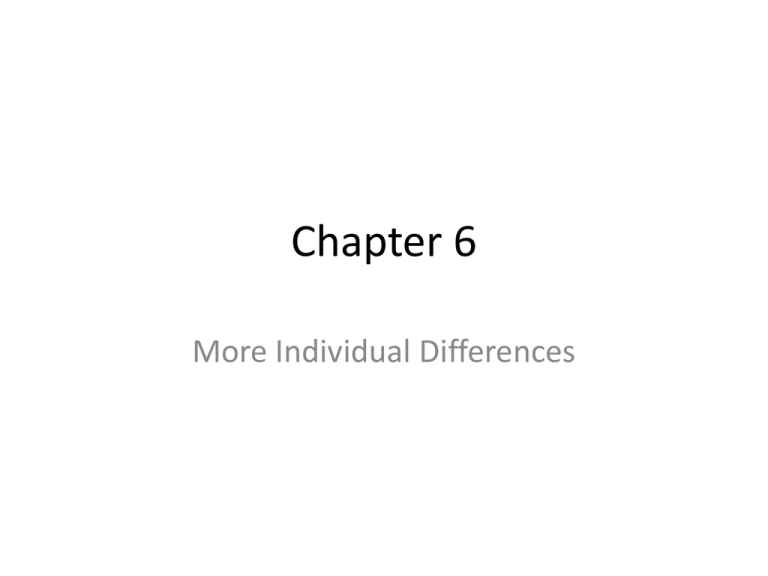
Chapter 6 More Individual Differences Values • Personal values – things that are meaningful in our lives and influence our behavior • Schwartz’s Value Theory – Values “represent broad goals that apply across contexts and time” – Values are stable and influence behavior – Values often operate without our knowing it Value Conflicts • Intrapersonal – Within the individual • Interpersonal – Between individuals • Individual-Organization – Organization’s values (culture) vs. individual values – Impacts satisfaction, commitment, performance, career success, stress, & turnover Work-family Conflict • Life values – overall values about what is important in life • Family values – beliefs about the importance of family and roles in the family • Work values– beliefs about the importance of career success • Value Similarity – consensus between family members about family values • Value Congruence – value agreement between employee and organization A Values Model of Work/Family Conflict Family Values General Life Values Value Similarity Work/Family Conflict Value Attainment Job and Life Satisfaction Value Congruence Work Values 6-7 Recent Trends in Work Family Conflict • Work interfering with family vs. family interfering with work • Norms about gender roles & housework are beginning to change • Culture is more important than any specific HR program • Good relationship with boss minimizes WFC • Flexible work hours minimizes WFC • Supportive spouses minimize WFC • WFC impacts satisfaction, commitment, & turnover Attitudes • The tendency to consistently respond positively or negatively to a specific stimulus – Values are general & attitudes are specific • Affective component – Feelings & emotions • Cognitive component – Thoughts & beliefs • Behavioral component – Behavioral intentions Attitude-Reality Inconsistencies • Creates cognitive dissonance – discomfort associated with attitude and behavior inconsistencies. • People are motivated to reduce cognitive dissonance by: – Changing the behavior or attitude – Belittle the importance of the behavior – Find consonant elements that outweigh negative ones How Attitudes Impact Behavior • Attitude toward the behavior - +/- evaluation of the behavior • Subjective norm – social pressure to engage in behavior • Perceived behavioral control – perceived ability to perform behavior succesfully Ajzen’s Theory of Planned Behavior Attitude toward the behavior Subjective norm Intention Behavior Perceived behavioral control 6-12 Organizational Commitment • The extent to which an individual identifies with the organization and is committed to its goals. • Related to working harder and wanting to stay with the company • Three components: – Affective Commitment – Continuance Commitment – Normative Commitment Affective Commitment • Emotional attachment and identification with the org. – Personality (locus of control) – Past work experience – Value congruence – Enhanced by a positive, satisfying work evironment Continuance Commitment • Awareness of the costs associated with leaving the org. – Other job alternatives – Enhanced by the number and quality of benefits • Retirement vesting Normative Commitment • Feeling obligated to the organization – Influenced by socialization • Psychological Contract – Individual perception of terms of an implied reciprocal exchange between individual and org. • Enhanced by high levels of trust Job Involvement • The degree to which one is preoccupied with and engaged in their job • Caused largely by intrinsic motivation • Related to satisfaction, commitment, turnover, and performance Job Satisfaction • How much someone likes their job. • Caused by: – Need fulfillment – Discrepancies – Value Attainment – Equity – Disposition Consequences of Job Satisfaction • Motivation • Job Involvement • Organizational Citizenship Behavior (OCB) – Voluntary – Helps Org. performance • Absenteeism • Withdrawal Cognitions Consequences of Job Satisfaction (continued) • Turnover – Separation costs – Replacement costs • Stress • Job Performance Counterproductive Work Behaviors (CWB) • Abuse from supervisors results in – Fewer OCBs – Retaliation (sabotage) – Violence • Causes of CWB: – Certain personality traits – Job conditions – Amount of autonomy & power – Cognitive ability
